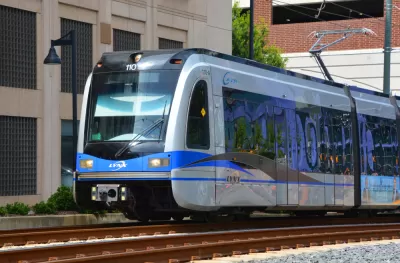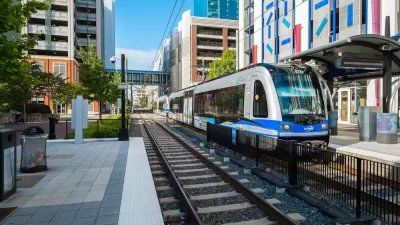Even if voters approve a new one-cent transit sales tax, will Charlotte be able to deliver on its promise of two new commuter rail lines and a new bus rapid transit line?

For the last four years, Charlotte and its transit agency have been working on a $13.5 billion rail-focused transportation plan. The plan hinges on the passage of a one-cent transit sales tax, 80 percent of which was originally planned to go toward building three new rail lines (the city currently only has one). But, according to an article from local NPR news outlet WFAE 90.7, recent political maneuverings to gain support of Republican legislators could be eroding the city’s ability to deliver on its ambitious transit promises.
“In a bid to win support from Republican legislators who want more money for roads, Charlotte and the Mecklenburg towns have agreed to a new framework that caps the amount of new money spent on trains at 40%. Roads would get 40% of new sales tax revenue and 20% would be set aside for things like buses,” writes Steve Harrison. As a result, the proposed — and most expensive — 26-mile Silver Line project from uptown to the town of Matthews will be replaced with bus rapid transit. “Matthews leaders are livid,” and the mayor is threatening to tell his residents to vote no on the new tax referendum, which could appear on the ballot in November 2025.
But upsetting Matthews voters could be the least of the transportation plan’s problems, Harrison reports. “It’s hard to see how less than a half-cent sales tax — 40% of a one-cent tax — can pay to build and operate all those lines.” Not to mention, Charlotte’s plan hinges on federal transit funding that is far from guaranteed. “In other words, Charlotte is still overpromising,” Harrison concludes.
FULL STORY: Charlotte looks like it's still overpromising on transit

Alabama: Trump Terminates Settlements for Black Communities Harmed By Raw Sewage
Trump deemed the landmark civil rights agreement “illegal DEI and environmental justice policy.”

Study: Maui’s Plan to Convert Vacation Rentals to Long-Term Housing Could Cause Nearly $1 Billion Economic Loss
The plan would reduce visitor accommodation by 25% resulting in 1,900 jobs lost.

Why Should We Subsidize Public Transportation?
Many public transit agencies face financial stress due to rising costs, declining fare revenue, and declining subsidies. Transit advocates must provide a strong business case for increasing public transit funding.

Paris Bike Boom Leads to Steep Drop in Air Pollution
The French city’s air quality has improved dramatically in the past 20 years, coinciding with a growth in cycling.

Why Housing Costs More to Build in California Than in Texas
Hard costs like labor and materials combined with ‘soft’ costs such as permitting make building in the San Francisco Bay Area almost three times as costly as in Texas cities.

San Diego County Sees a Rise in Urban Coyotes
San Diego County experiences a rise in urban coyotes, as sightings become prevalent throughout its urban neighbourhoods and surrounding areas.
Urban Design for Planners 1: Software Tools
This six-course series explores essential urban design concepts using open source software and equips planners with the tools they need to participate fully in the urban design process.
Planning for Universal Design
Learn the tools for implementing Universal Design in planning regulations.
Smith Gee Studio
Alamo Area Metropolitan Planning Organization
City of Santa Clarita
Institute for Housing and Urban Development Studies (IHS)
City of Grandview
Harvard GSD Executive Education
Toledo-Lucas County Plan Commissions
Salt Lake City
NYU Wagner Graduate School of Public Service




























